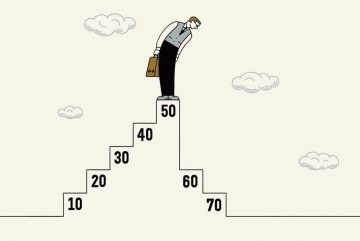Arthur C. Brooks in The Atlantic:
 The field of “happiness studies” has boomed over the past two decades, and a consensus has developed about well-being as we advance through life. In The Happiness Curve: Why Life Gets Better After 50, Jonathan Rauch, a Brookings Institution scholar and an Atlantic contributing editor, reviews the strong evidence suggesting that the happiness of most adults declines through their 30s and 40s, then bottoms out in their early 50s. Nothing about this pattern is set in stone, of course. But the data seem eerily consistent with my experience: My 40s and early 50s were not an especially happy period of my life, notwithstanding my professional fortunes.
The field of “happiness studies” has boomed over the past two decades, and a consensus has developed about well-being as we advance through life. In The Happiness Curve: Why Life Gets Better After 50, Jonathan Rauch, a Brookings Institution scholar and an Atlantic contributing editor, reviews the strong evidence suggesting that the happiness of most adults declines through their 30s and 40s, then bottoms out in their early 50s. Nothing about this pattern is set in stone, of course. But the data seem eerily consistent with my experience: My 40s and early 50s were not an especially happy period of my life, notwithstanding my professional fortunes.
So what can people expect after that, based on the data? The news is mixed. Almost all studies of happiness over the life span show that, in wealthier countries, most people’s contentment starts to increase again in their 50s, until age 70 or so. That is where things get less predictable, however. After 70, some people stay steady in happiness; others get happier until death. Others—men in particular—see their happiness plummet. Indeed, depression and suicide rates for men increase after age 75.
More here.
